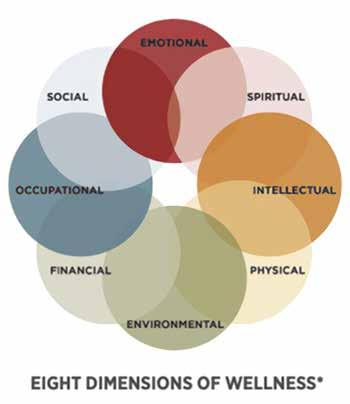
3 minute read
Why Prioritizing Mental Wellness Matters
Exploring the journey to mental & emotional health
WRITTEN BY AMANDA KOSTURA, LISW-S
Advertisement
Mental and Emotional Health is a key factor in our ability to navigate the world around us safely and confidently. According to the Centers for Disease Control (CDC), adults with disabilities report mental distress almost five times as often as adults without disabilities. This area continues to hold stigma; therefore, we miss opportunities to provide education and prevention services that could improve someone’s life satisfaction.
There’s significant stress experienced by caregivers as well — between 40%-70% of family caregivers have clinically significant symptoms of depression. When we’re experiencing challenges with our mental health that aren’t being addressed, we may notice impacts on our other areas of wellness. Understanding the many dimensions of wellness can help us set tangible goals to ensure individuals and caregivers have a better quality of life.
To assist in explaining this concept, I’d like to reference “The Eight Dimensions of Wellness” as published by the Substance Abuse and Mental Health Services Administration (SAMHSA). This is a tool we use in practice at Carve Your Own Path, Inc. to improve wellness from a holistic approach.
Each of the eight dimensions is arranged in a circle, overlapping and intersecting with one another. The dimensions are Emotional, Spiritual, Intellectual, Physical, Environmental,
Financial, Occupational, and Social. It is recommended to look at these dimensions through a mindful selfinventory lens. Check in with yourself and ask how you’re doing in each area and how the areas are interacting with one another. Once you have this awareness, do not judge it, simply notice and be curious about what that means for you moving forward.

Let me give an example of how these interwoven wellness factors can impact each other, ultimately impacting our overall health and life satisfaction — if we don’t have the skills to effectively cope with life and have meaningful relationships, our emotional wellness is needing attention. When we aren’t coping well with life, we may not be coping well with relationship dynamics, leading to ripples in our social and occupational wellness. This is where we may notice increased disagreements or irritability with others in our life. When we aren’t coping well, feel unable to authentically connect with others, and don’t have a sense of purpose, we might notice lacking motivation. Loss of motivation can impact our ability to keep up with our environmental wellness activities. Our intellectual wellness can be impacted by unmanaged stress, leading to fogginess and forgetfulness.
Significant stress on the brain can distract from our focus on financial wellness tasks like paying bills. I could go on … but, I think, you see what’s happening here. The overlapping impacts of a depleted dimension of wellness are widespread. This is where we recommend keeping it simple to prevent feeling overwhelmed. Write down each dimension of wellness, ask yourself how you’re doing in that area, and what you’ll need to help you get where you want to be. Go for the lowhanging fruit and keep the focus small and achievable to build momentum. For example, if you notice you aren’t saving as much money as you would like to be, set a target (save $____ by this date _____ ) and actionable steps to reach it (save $____ per week).
Feeling overwhelmed by this process? Working with a mental health therapist can provide safe support for you to process this area and set realistic action steps for you to work toward your goals.










